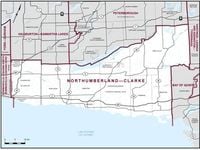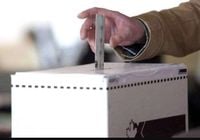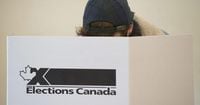Residents in Brantford and nearby areas will soon exercise their right to vote in a federal election set for April 28, 2025. This upcoming election presents a crucial opportunity for local constituents to either re-elect incumbent Larry Brock of the Conservative Party or choose a new representative for their interests in Ottawa. The recent political landscape has been lively, especially after the local voters returned Progressive Conservative MPP Will Bouma to the Ontario Legislature for a third term just this past February.
The new riding of Brantford-Brant South-Six Nations emerged from the federal electoral district redistribution of 2022, replacing the previous Brantford-Brant riding. This revitalized constituency encompasses all of Brantford, parts of Brant County, the Mississaugas of the Credit First Nation, and the Six Nations of the Grand River Territory. With the election nearing, only two parties—the Conservatives and the Green Party of Canada—have officially announced candidates for this newly shaped federal riding.
Karleigh Csordas, who represented the Greens in the provincial election earlier this year, has now taken on the role of their candidate for the federal election. While the Liberal Party of Canada and the New Democratic Party (NDP) have yet to declare candidates for the constituency, Csordas is already on the campaign trail.
On March 22, 2025, Larry Brock officially launched his campaign with a ribbon-cutting ceremony for his new campaign office, an event that attracted a large crowd of supporters eager to rally behind their candidate. Brock emphasized during his speech that ten years of Liberal governance has left Canada with a substantial debt that, if unaddressed, will become a burden for future generations.
“We are your servants, you are the masters,” Brock asserted, promising that a common-sense Conservative government, led by Pierre Poilievre, would aim to make life more affordable. He stressed goals such as reducing the cost of housing, hoping to inspire optimism in young Canadians trapped in cycles of renting or living with parents.
In stark contrast, newly nominated Green Party candidate Karleigh Csordas expressed her sorrow that the election coincides with the National Day of Mourning, a day dedicated to remembering and honoring workers who have lost their lives or faced health issues due to workplace hazards. Csordas, who carried the emotional weight of this day with personal connections—her uncle Bryn Stoneman died on the job in August 2020—advocated for the significance of recognizing this day above election noise.
“I call on all politicians to acknowledge and respect the Day of Mourning first,” Csordas urged, emphasizing the importance of honoring families impacted by such tragedies. She added, “I know the pain of waiting for a family member to come home, only to learn they never will.”
Both candidates face the broader context of economic concerns, with Csordas highlighting rising living costs, affordable housing, and environmental challenges as critical issues that necessitate unity across party lines. “In my first election, I was called a breath of fresh air, and I really think that’s what we need right now,” Csordas stated, emphasizing her commitment to cooperation and integrity in leadership.
In a broader narrative concerning the upcoming election, former politicians from northern Ontario provide insights about campaign strategies leading to this pivotal vote. Glenn Thibeault, a former Sudbury MP, advises against placing too much emphasis on pre-election polls, suggesting that interactive campaigning—involving door-knocking and direct voter engagement—will ultimately determine the election outcome.
“Polling numbers—take them with a grain of salt, because at the end of the day, what you need to do is have hard work,” Thibeault noted. His perspective echoes sentiments from retiring NDP MP Carol Hughes, who has observed similar challenges with polling misrepresenting her party’s potential performance in past elections.
Strategic campaigning is essential, particularly as Conservative Leader Pierre Poilievre appears to be off to a strong start, addressing significant policy issues, including a proposed 15% tax cut. Tony Clement, a former MP, commended Poilievre's engagement with substantive issues, laying the groundwork for impactful dialogue during the campaign.
As the election approaches, the changing electoral landscape also sees major shifts in riding boundaries nationwide, a reaction to Canada’s latest ten-year census. Notably, the Northumberland-Clarke riding has emerged, encompassing communities such as Cobourg, Brighton, and the Alderville First Nation. Spokesperson for Elections Canada, Diane Benson, has well-explained the necessity of such changes to maintain equitable population representation.
With only five weeks left until Canadians head to the polls, the significance of understanding these new riding lines becomes apparent. Voters now have a crucial responsibility to confirm their updated electoral status, ensuring that they are informed about their voting locations, as many will find that their polling stations may have changed.
As elections postured in the context of economic challenges and shifting demographics propel forward, candidates like Csordas and Brock are positioning themselves to respond to local needs. Meanwhile, analysis from former officials indicates that successful campaigning hinges not merely on numbers but on the policies and candidate engagement reflected during these five weeks of campaigning.
Through all the debates, public events, and campaigning, the voices of both Karleigh Csordas and Larry Brock echo the diverse priorities of Brantford residents as they move toward this decisive election, where every vote will help shape the future of their representation in federal government.




